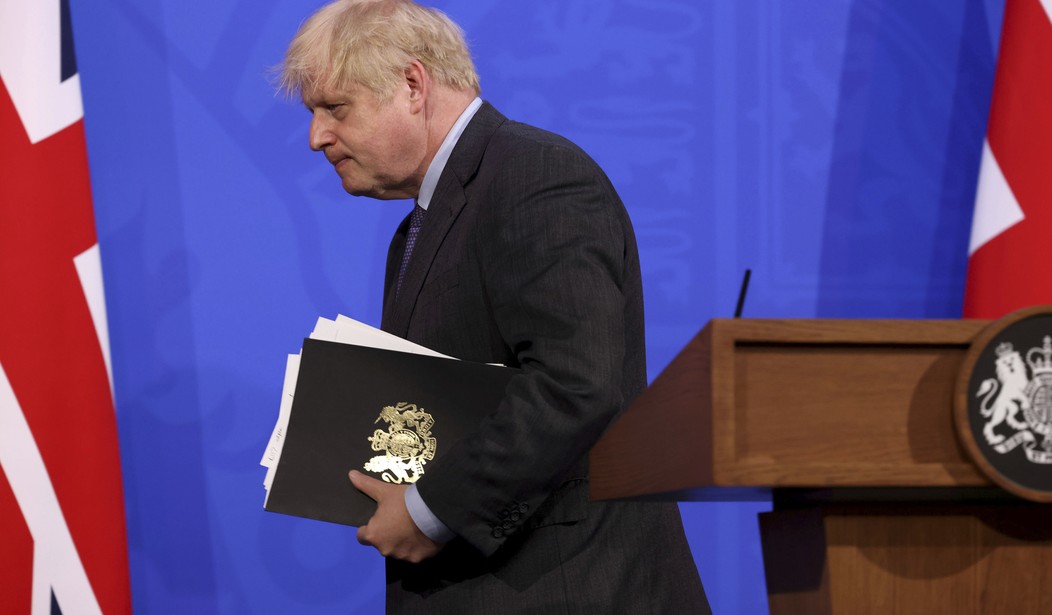As we discussed last week, Great Britain is currently dealing with a severe gas shortage at the pumps and long gas lines have been forming at the petrol stations that still have any left. But it’s not just gasoline, heating oil, and other fuels. Grocery store shelves are going bare and people are starting to ask if they will even be able to buy a turkey or a ham for Christmas.
As we previously noted, none of these “shortages” are the result of a lack of fuel or food in the country. They simply don’t have enough truck drivers to bring all of the products to where they need to be. This has led some of Johnson’s critics from the “Remain” contingent to once again hoist up the EU flag (metaphorically speaking) and claim that Brexit is the cause of the driver shortage that threatens to break the supply chain and hinder the ability of people to obtain the goods and services they require. BoJo is having none of it, however, and insists that his country will not return to the days of “uncontrolled immigration” into their country. (Reuters)
British Prime Minister Boris Johnson said on Sunday he would not return to “uncontrolled immigration” to solve fuel, gas and Christmas food crises, suggesting such strains were part of a period of post-Brexit adjustment.
At the start of his Conservative Party’s conference, Johnson was again forced to defend his government against complaints from those unable to get petrol for their cars, retailers warning of Christmas shortages, and gas companies struggling with a spike in wholesale prices.
The British leader had wanted to use the conference to turn the page on more than 18 months of COVID-19 and to refocus on his 2019 election pledges to tackle regional inequality, crime and social care.
It seems to me that the middle of a pandemic during a period of increased unrest around the world isn’t really a good time to start trying to drum up a third Brexit fight. But if that’s what the Labour Party wants, I suppose it’s up to them.
There’s no denying that the inability to find enough tractor-trailer drivers to carry all of the required food and fuel is in part being worsened by the loss of foreign drivers from the EU who used to cross the channel for temporary work. But that’s only a small part of the bigger picture. This driver shortage is affecting all developed nations, including the United States. As we’ve discussed here previously, the primary driver of this problem is the pandemic. A lot of drivers lost their jobs during the shutdowns and went into other lines of work. And it take time for the available schools to train and license a new army of drivers.
Britain’s problems are compounded by the fact that the pandemic caused massive international travel restrictions, far more so than immigration checkpoints in post-Brexit Great Britain. Almost nobody was being allowed in and out. Johnson has already taken steps to try to alleviate the situation by expediting visa applications for EU drivers seeking to come back to work, but that will take a few weeks to sort out.
This crisis is going to pass, both in America and overseas. The demand for drivers is so great that the starting pay rates being offered are quite high and trucking companies are attracting a lot of new drivers. But I think the lesson we should be taking away from all this is, once again, the fact that we’re witnessing another example of how dependent we have become on our technology and how quickly things can go massively astray when those systems fail us.
When I write about technological failure on a massive scale and the possibility of such an event driving us toward societal collapse, I’m usually referring to something like a massive electromagnetic pulse taking out all of our electronics and satellites. But even more established technologies can land us in the same predicament. I was watching a report on these shortages recently and one industry analyst reminded everyone that more than 80% of the food and other products we use are still carried by truckers in most of the developed nations of the world. An internal combustion engine doesn’t sound like wondrous new technology to anyone at this point, but that’s a reminder of just how heavily we depend on it. We can still be producing all of the food and fuel we could ever need, but if we have no way of getting it to the places where people can access it, particularly in the larger cities, the shelves will be bare and the petrol stations dry in as little as four days. And if that condition persists for much longer than that, you’re heading for Mad Max territory pretty quickly.
The threats to both the global supply chain and the local versions, whether they come from China or just some systemic technical failure need to be taken seriously. And it’s time for world leaders to start developing a Plan B for those scenarios.








Join the conversation as a VIP Member